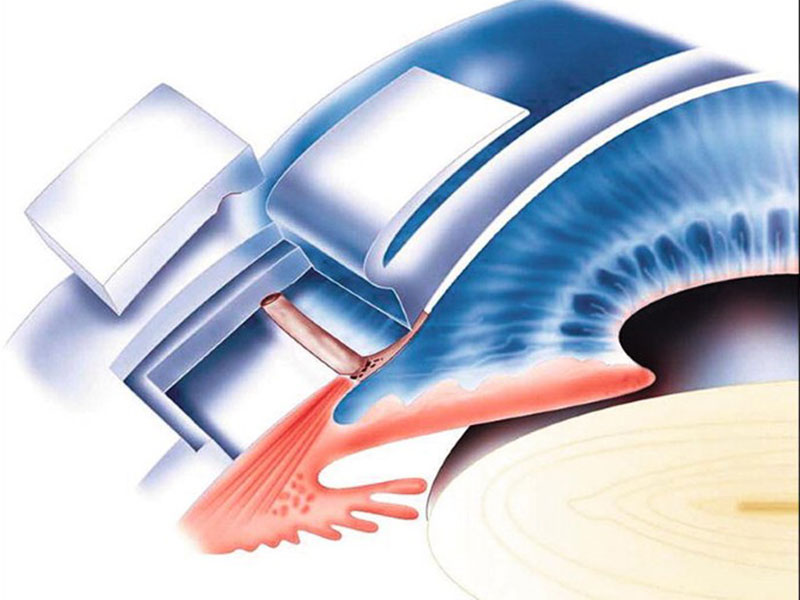Deep Sclerectomy Surgery in Germany 2025
Deep Sclerectomy surgery is a non-penetrating glaucoma surgery widely performed in Germany to reduce intraocular pressure (IOP) while minimizing complications common in traditional filtration procedures. It has gained attention among both local and international patients for being effective, safer, and less invasive than trabeculectomy.
This advanced glaucoma surgery involves precise removal of parts of the sclera to enhance the eye’s natural drainage system, ensuring better fluid outflow and sustained pressure reduction.
How Deep Sclerectomy Works
During Deep Sclerectomy, the surgeon carefully removes a small portion of the outer scleral layer and creates a filtration space called a scleral lake, allowing fluid (aqueous humor) to drain without entering the eye directly. This results in a gradual and controlled decrease in eye pressure.
German ophthalmologists often enhance the procedure using collagen implants or anti-scarring agents to keep the new drainage pathway open and ensure long-term results.
Deep Sclerectomy Cost in Germany
The cost of Deep Sclerectomy surgery in Germany typically ranges from €2,000 to €3,800 per eye, depending on:
The clinic’s location and reputation
Surgeon’s level of experience
Hospital facilities and post-operative care
This cost usually covers pre-surgery assessment, operation fees, anesthesia, and post-operative follow-ups.
Read our complete guide to glaucoma expenses in the Germany
(https://glaucoma.ph/glaucoma-surgery-cost-germany-2025-guide/)
Advantages of Deep Sclerectomy
German specialists recommend Deep Sclerectomy for its balance between safety and efficiency. Compared to more invasive glaucoma surgeries, it has fewer complications and faster healing.
Key Benefits Include:
Lower risk of hypotony (excessively low eye pressure)
Faster visual recovery and minimal discomfort
Reduced chance of infection due to the non-penetrating nature
Long-term IOP control with fewer follow-up interventions
Customizable with implants or anti-scarring solutions
This technique is particularly suited for patients where trabeculectomy carries higher risk or previous surgery has failed.
Who Can Benefit from Deep Sclerectomy
Deep Sclerectomy surgery is ideal for patients with:
Primary open-angle glaucoma
Pseudoexfoliation or pigmentary glaucoma
Moderate to advanced glaucoma not responding to eye drops
Patients requiring a lower-risk alternative to traditional surgery
Your ophthalmologist in Germany will determine eligibility based on eye structure, pressure levels, and medical history.
Procedure and Recovery
The Deep Sclerectomy procedure takes about 45–60 minutes per eye and is typically performed under local anesthesia. Patients can usually return home the same day.
Post-operative care includes:
Topical anti-inflammatory drops for several weeks
Avoiding heavy physical activity
Regular follow-up visits to monitor drainage function
Most patients notice significant IOP reduction within the first few weeks. German hospitals emphasize close monitoring to ensure stability and prevent scarring of the filtration site.
Success Rate and Outcomes in Germany
German glaucoma centers report success rates of 80–90% for Deep Sclerectomy, with results lasting several years. The addition of collagen implants and mitomycin-C treatment further enhances long-term success.
Compared to trabeculectomy, Deep Sclerectomy offers fewer complications, more comfort, and greater safety, making it a strong choice for many patients.
Why Choose Germany for Deep Sclerectomy
Germany is recognized for its advanced ophthalmic technology, highly skilled glaucoma surgeons, and comprehensive patient care. Many clinics specialize in minimally invasive and non-penetrating glaucoma procedures, offering excellent results with reduced risks.
By choosing Germany, patients benefit from:
Precision-driven surgical techniques
Access to modern glaucoma facilities
Personalized aftercare programs
Transparent cost breakdowns and insurance coordination
Final Thoughts
Deep Sclerectomy surgery in Germany represents a refined, safe, and effective option for managing glaucoma when medications are no longer enough. Its minimally invasive approach, stable results, and reduced complication rate make it an increasingly popular choice for both domestic and international patients.
With German ophthalmology’s focus on precision and patient comfort, Deep Sclerectomy continues to stand out as one of the best options for sustained eye pressure control and long-term glaucoma management.




